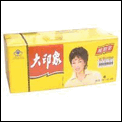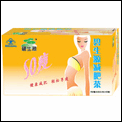- Chinese Medicine for cardiovascular diseases and heart
- Chinese Medicine for gastro-intestinal disorders (poor appetite, indigestion, gastritis, diarrhea)
- Chinese Medicine for men (prostatitis, impotence etc.)
- Chinese Medicine for women (gynecological conditions, pre-menstrual syndrome, infertility)
- Chinese Medicine for liver syndromes (fatty liver, hepatitis)
- Chinese Medicine skin diseases (swelling, eczema, psoriasis)
- Chinese Medicine for asthma, bronchitis, chronic coughs
- Chinese Medicine for rheumatism, arthritis, osteoarthritis
- Chinese Medicine for hypertension
- Chinese Medicine for allergies
- Chinese Medicine for common cold and flu, sore throat
- Chinese Medicine for pain relieve
- Chinese Medicine for fatigue syndrome
- Chinese Medicine for weight loss
Da Yin Xiang Jian Fei Cha or ¤j¦L¶H减ªÎ¯ù
Da Yin Xiang Jian Fei Cha is effectively reducing weight, decreasing lipids in blood, preventing acquired simple obesity. Probably the best of natural weight loss products presented on Chinese market.
Direction for use A sachet of the tea is soaked in approx 170ml of boiled water for 5-10 minutes, this can be done for two times in a row. At first, it is most appropriate to drink before sleeping,
one sachet every evening in the first week, each in the morning and evening from the second week, and 45 days is the course of use.
Manufacturer: Shantou Great Impression Group
Read more...
After drinking Chinese Slimming Bishengyuan Tea for the first time, you can feel its effectiveness the same day. The tea reduces weight thoroughly and entirely, improving obesity physique.
Dosage
A sachet of the tea every morning and evening, each time 1-2 sachets Keep out of reach from children.
Do not use during pregnancy.
The net weight is 50g, 2.5g* 20 sachets per box
Manufacturer: Beijing Outsell Health Product Development Co., Ltd.
Read more...
Metabolic effects of green tea and of phases of weight loss.
Diepvens K, Kovacs EM, Vogels N, Westerterp-Plantenga MS.
Maastricht University, Department of Human Biology, P.O. Box 616 NL-6200 MD, Maastricht, The Netherlands. K.Diepvens at HB.Unimaas.NL
The effect of ingestion of green tea (GT) extract along with a low-energy diet (LED) on health-related blood parameters, and the relationships among changes in metabolic parameters and phases of weight loss were assessed. A double-blind, placebo-controlled, parallel design was used. 46 female subjects (BMI 27.7+/-1.8 kg/m(2)) were fed in energy balance from days 1 to 3, followed by a LED with GT (n=23) or placebo (PLAC, n=23) from days 4 to 87. The LED-period consisted of a phase 1 of 4 weeks (days 4-32) followed by a phase 2 of 8 weeks (days 32-87). Body composition and fasting blood samples were determined on days 4, 32 and 87. No significant differences were observed between the blood parameters of the PLAC and GT group. In phase 1 compared to phase 2 the rate of weight loss was 0.09+/-0.05 kg/day vs. 0.03+/-0.03 kg/day (p<0.001); Fat free mass (FFM) was 21% of weight loss in phase 1 vs. 7% in phase 2 (ns). Surprisingly, favourable changes in free fatty acids, triacylglycerol, beta-hydroxybutyrate, glucose and total cholesterol in phase 1 were reversed in phase 2 (p<0.01). Taken together, GT supplementation during a LED had no effect on health-related blood parameters. Initial improvements in several blood measures at day 32 were reversed by day 87, despite continued weight loss. Modest weight loss improved HDL cholesterol and blood pressure.
Anti-obesity drug use before professional treatment in Taiwan.
Liou TH, Wu CH, Chien HC, Lin WY, Lee WJ, Chou P.
Community Medicine Research Center and Institute of Public Health, National Yang Ming University, Peitou, Taipei, Taiwan.
Between July 2004 and June 2005, a cross-sectional study was performed to determine the prevalence and patterns of anti-obesity medicine use among subjects seeking obesity treatment in Taiwan. Eighteen obesity outpatient clinics were selected via a random stratified sampling method and 1,060 first-visit clients (791 females and 269 males) aged above 18 years were enrolled and then completed a self-administered questionnaire. The prevalence of anti-obesity medicine use was 50.8%; more females than male used anti-obesity medicines (53.6% vs. 42.4%). Of the 1,060 subjects, 17.1% had used orlistat, 21.1% had taken sibutramine, and 18.3% had utilized un-proven drugs such as cocktail therapy and other anti-obesity drugs. Furthermore, 23.6% and 22.4% of subjects indicated that they concurrently used Chinese herbal preparations and dietary supplements, respectively. Logistic regression analyses demonstrated that the odds ratio (OR) for anti-obesity medicine use was substantially higher in females (OR, 1.9; 95% CI, 1.3-2.6), those aged 18-24 years (OR, 1.6; 95% CI, 1.0-2.6), those with a body mass index (BMI) >35 kg/m2 (OR, 3.4; 95% CI, 2.1-5.7) and respondents concurrently using Chinese herbal preparations (OR, 1.7; 95% CI, 1.2-2.4) and dietary supplements (OR, 2.2; 95% CI, 1.6-3.1). In conclusion, the prevalence of anti-obesity drugs use is high among Taiwanese adults before they seek obesity treatment. Young, obese females, and those who had taken Chinese herbal preparations/dietary supplements had a high likelihood to report using anti-obesity medicines. Use of unproven weight-loss drugs is common and warrants further investigation.
This is the page for Chinese medicine for weight loss



